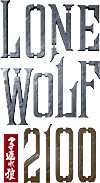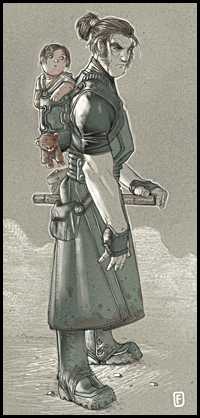 It can be a risky thing, adapting, or extrapolating upon, or re-working classic works -- whether they be films, novels, or comics. The fact that so many of your audience love the original will work both for you and against you. Even if you manage to do a brilliant job, there will be those nay-sayers who dislike the new work simply because it isn't the original. Take Peter Jackson's The Lord of the Rings, for example. While the film has received overwhelming critical and popular acclaim, there are still those diehards who despise it because portions of Prof. Tolkien's epic novel have, in the transition to film, been cut, condensed, or altered.
It can be a risky thing, adapting, or extrapolating upon, or re-working classic works -- whether they be films, novels, or comics. The fact that so many of your audience love the original will work both for you and against you. Even if you manage to do a brilliant job, there will be those nay-sayers who dislike the new work simply because it isn't the original. Take Peter Jackson's The Lord of the Rings, for example. While the film has received overwhelming critical and popular acclaim, there are still those diehards who despise it because portions of Prof. Tolkien's epic novel have, in the transition to film, been cut, condensed, or altered. But, if there's one thing we've learned at Dark Horse, it's that you can't please everybody.  And if we've learned two thing's, the second is nothing ventured, nothing gained. Sometimes risks are worth it, no matter what the purists may say. I'm thinking here of last year's Star Wars: Infinities -- A New Hope series, the concept of which was to change one pivotal event from those in the film Star Wars: A New Hope and see how that single change would affect the rest of the story. Within days of the announcement of the project, Star Wars purists were decrying Dark Horse's temerity at altering a classic -- this despite the fact that series was done with Lucasfilm's blessing and oversight, and that those complaining had not seen a single panel of the comic. Online message boards were filled with calls for editor Dave Land's head and wails of despair over Lucasfilm "selling out" the cornerstone of its empire.
And if we've learned two thing's, the second is nothing ventured, nothing gained. Sometimes risks are worth it, no matter what the purists may say. I'm thinking here of last year's Star Wars: Infinities -- A New Hope series, the concept of which was to change one pivotal event from those in the film Star Wars: A New Hope and see how that single change would affect the rest of the story. Within days of the announcement of the project, Star Wars purists were decrying Dark Horse's temerity at altering a classic -- this despite the fact that series was done with Lucasfilm's blessing and oversight, and that those complaining had not seen a single panel of the comic. Online message boards were filled with calls for editor Dave Land's head and wails of despair over Lucasfilm "selling out" the cornerstone of its empire.
But you know what? Infinities ended up being the most popular Star Wars series of the past several years. Once the audience read it, they discovered they liked it. It wasn't the Star Wars the audience knew, but it was true to the spirit of what they loved about Star Wars. Just as the film The Lord of the Rings has done nothing to dilute the power of the novel, so the Infinities comics series took nothing away from the experience of watching Star Wars: A New Hope. Wonder of wonders, the new works exist in harmony with their progenitors.
In May, we're sticking our collective necks out again -- this time with Lone Wolf and Cub.
In conjunction with MegaHouse (the official licensor of Lone Wolf and Cub), and under the watchful eye and with full approval of Lone Wolf's co-creator Kazuo Koike (artist Goseki Kojima passed away in 2000), Dark Horse is launching Lone Wolf 2100. Set one hundred years in our future, the series follows the adventures of a mysterious warrior named Itto and a young girl named Daisy -- the daughter of Itto's former employer. Together they face human, robot, and android adversaries, as well as the threat of a manmade virus that is ravaging the globe. Except for a few names, and the basic situation of a taciturn warrior traveling with a child, it's not the "real" Lone Wolf and Cub. Nor is it meant to be.
Writer Mike Kennedy (Star Wars: Underworld) and artist Francisco Ruiz Velasco (Battle Gods) have created a new tale that is respectful of, and true to, the spirit of the original; a fitting addition to the films, the television series, and other spin-off projects that already harmoniously co-exist with Koike and Kojima's classic. Stop by your local comics shop in May and see for yourself.
Randy Stradley
one of the Dark Horse neck-sticker-outers